Published and translated by the firm Winter – Dávila & Associés
Paris, 15 November 2022

Author: Miguel Ángel Dávila
Lawyer from the University of Lima (Peru); member of the Lima Bar Association (Ilustre Colegio de Abogados de Lima) since 2011 and member of the Paris Bar Association (Barreau de Paris) since 2022. Master 2 in Law, management and economics of sport from the Université Paris 1 – Panthéon Sorbonne (France); arbitrator of the Chamber of Conciliation and Dispute Resolution (CCRD) of the Peruvian Football Federation (FPF); president of the Justice Commission (CJ) of the Peruvian Rugby Federation (FPR); partner of Estudio Valdivia – Dávila & Asociados (Peru); partner of Winter – Dávila & Associés (France); member of the Director Committee of the Association Droit du Sport Paris I Panthéon – Sorbonne (DSS) of France; secretary of the Ibero-American Institute of Sports Law of Brazil (IIDD) and former player of the Peruvian National Rugby Team.
📍Versions of the article availables in others languages:
🇪🇸 Versión en Español
🇫🇷 Version Française
Do you need lawyers in France? Do not hesitate to contact us!
Recently, exactly on 21 October 2022, the Fédération Internationale de Football Association (FIFA) has published the Arbitration Rules for the Final Phase of the FIFA World Cup Qatar 2022 (1) (hereinafter referred to as the Rules) In that sense, the possible arbitrations that may take place during the world’s greatest football competition will be conducted by an Ad Hoc Division (hereinafter referred to as the AHD) of the Court of Arbitration for Sport (CAS)
As is to be expected, the Rules have certain particularities to highlight, however, before discussing them, it is necessary to start by answering a simple question:
What is a CAS Ad Hoc Division?
The AHD of the Court of Arbitration for Sport is provided for in paragraph 8 of Article S6 CAS Code of Arbitration for Sport. It was initially conceived to administer sporting justice during the Olympic Games and made its first appearance at the 1996 Atlanta Olympics. Subsequently, in 2003, Arbitration Rules for the Olympic Games were drafted.
YOU CAN ALSO READ: The four Chambers of The Court of Arbitration for Sport
On the other hand, thanks to the success of the AHD at the Olympic Games, the International Council of Arbitration for Sport (ICAS), installed different Ad Hoc arbitration structures in other major sporting events such as the FIFA World Cups, competitions organised by the Union of European Football Associations (UEFA) or even by other regional Olympic committees.
Having indicated where the Ad Hoc Division is planned, as well as a brief historical reference, we can answer the initial question. Well, in short, an AHD of the CAS is an arbitration chamber that is created and installed for a specific major sporting event, with the purpose of resolving disputes arising during the holding of the said sporting event by means of arbitration, for which it draws up a special list of arbitrators and whose main characteristic is the speed of the arbitration proceedings.
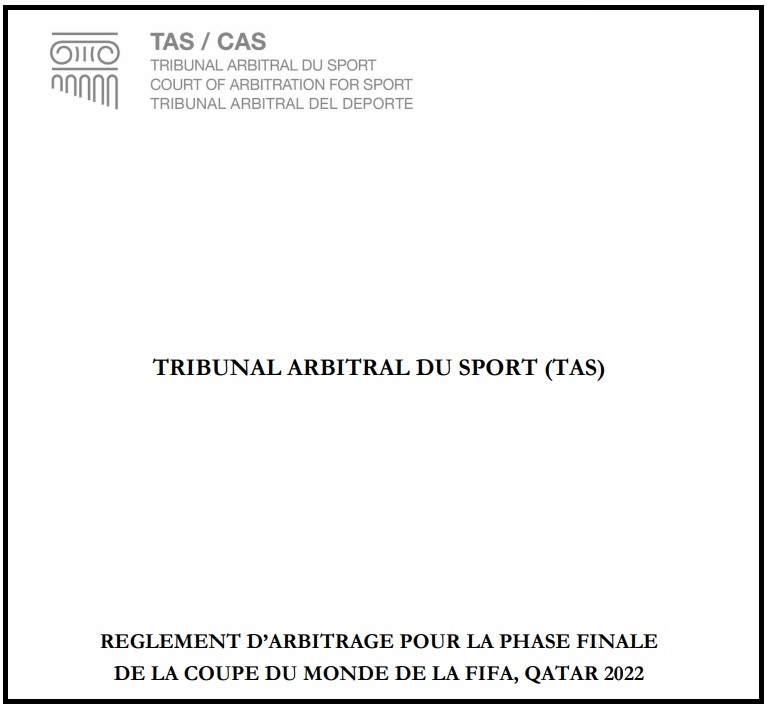
Front page in French
The CAS Ad Hoc Division in the Qatar World Cup
As we pointed out at the beginning of this article, FIFA recently published the Regulations that will be used by the AHD at the next World Cup in Qatar, which starts in less than a week. Its main features are as follows:
– The Regulations will apply between 20 November and 18 December 2022.
– The special list of referees will consist only of members of the CAS list of football referees.
– The arbitration may be conducted in English, French or Spanish, which shall be determined by the president of the AHD.
– The arbitration shall be governed by Chapter 12 of the Swiss Private International Law Act.
– The arbitration may be conducted by a sole arbitrator or a panel of three arbitrators.
– The dispute shall be decided in accordance with FIFA regulations and, in the alternative, in accordance with Swiss law.
– The award shall be rendered within 48 hours of the submission of the request. Exceptionally, this time limit may be extended if circumstances allow.
– The Arbitral Formation or the sole arbitrator may make an award on one part of the dispute and refer the other unresolved part to a general CAS procedure.
– The award is immediately enforceable and cannot be appealed.
– In case of divergence between the English, French and Spanish versions of the Rules, the English text prevails.
YOU CAN ALSO READ: The evidences before the Court of Arbitration for Sport (CAS)
As can be seen, the Rules have been drafted in a “conservative” way and do not bring any major innovations compared to other similar rules or even to the Rules of Arbitration for the Olympic Games, apart from the specificity that the arbitrators must belong exclusively to the CAS list of football referees.
If you liked this topic, we invite you to share the article, comment on it and also to visit the rest of publications in the social networks and platforms of Winter – Dávila et Associés
If you want advice related to the subject of the article, do not hesitate to contact us! (email: contact@wdassocies.com)
Original language of the article: Spanish
LEGAL NOTICE: This article has been prepared for informational purposes only. It is not a substitute for legal advice directed to particular circumstances. You should not take or refrain from taking any legal action based on the information contained without first seeking professional, individualized advice based on your own circumstances. The hiring of a lawyer is an important decision that should not be based solely on advertisements.
References
(1) Downloadable in English at the following link: https://digitalhub.fifa.com/m/47ef3004972d4b3a/original/Arbitration-Rules-for-FIFA-World-Cup-Qatar-2022-CAS.pdf
This article was published by Winter – Dávila & Associés, an international law firm based in Paris, in France, represented by lawyers specialized in sports law, corporate law, arbitration and representation.


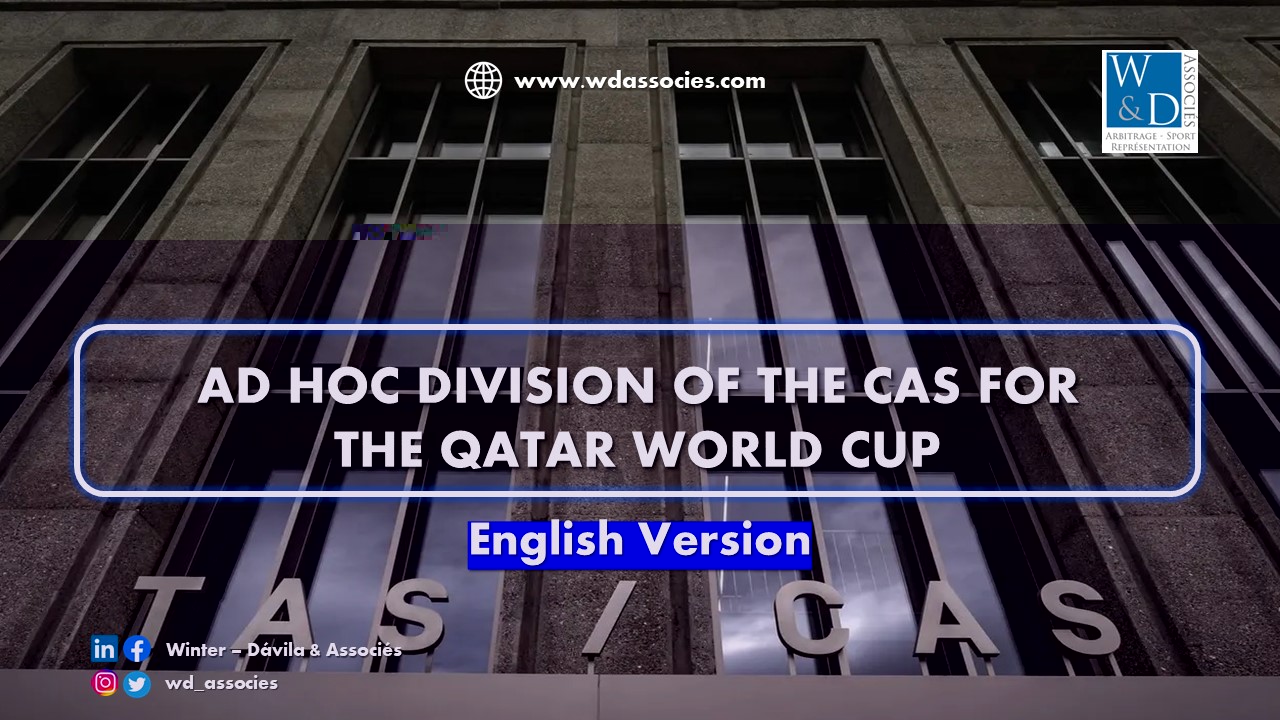
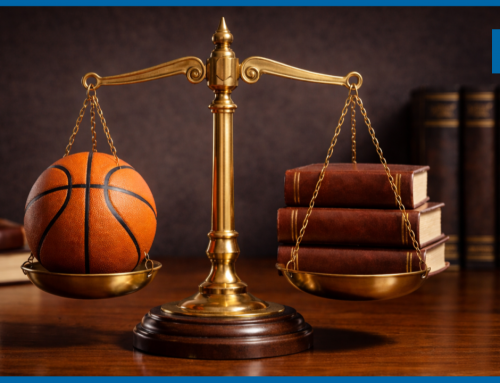
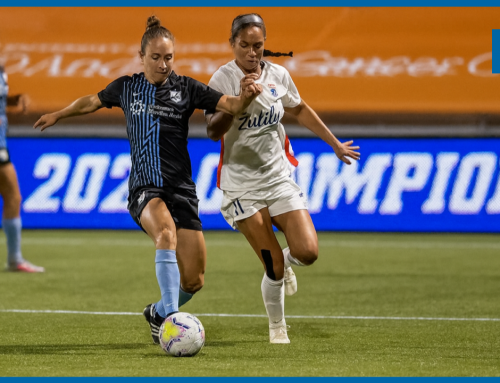
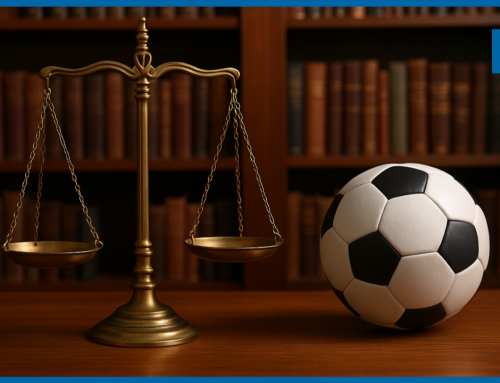


Leave A Comment